-
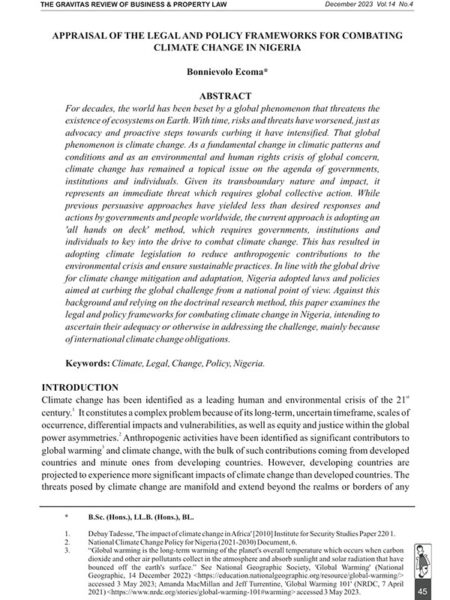
Appraisal of the Legal and Policy Frameworks for Combating Climate Change in Nigeria
0₦2,500.00Bonnievolo Ecoma, in this article, Appraisal of the Legal and Policy Frameworks for Combating Climate Change in Nigeria, appraises the legal and policy frameworks for combating climate change in Nigeria. For decades, the world has been beset by a global phenomenon that threatens the existence of ecosystems on Earth. With time, risks and threats have worsened, just as advocacy and proactive steps towards curbing it have intensified. That global phenomenon is climate change. As a fundamental change in climatic patterns and conditions, and as an environmental and human rights crisis of global concern, climate change has remained a topical issue on the agenda of governments, institutions, and individuals. Given its trans-boundary nature and impact, it represents an immediate threat which requires global collective action. While previous persuasive approaches have yielded less than desired responses and actions by governments and people around the world, the current approach is the adoption of an ‘all hands on deck’ method which requires governments, institutions and individuals to key into the drive to combat climate change. This has resulted in the adoption of climate legislation aimed at reducing anthropogenic contributions to the environmental crisis, and ensuring sustainable practices. In line with the global drive for climate change mitigation and adaptation, Nigeria adopted laws and policies aimed at curbing the global challenge from a national point of view. Against this background and relying on the doctrinal research method, Ecoma examines the legal and policy frameworks for combating climate change in Nigeria, with a view to ascertaining their adequacy or otherwise in addressing the challenge, especially in view of international climate change obligations.
-
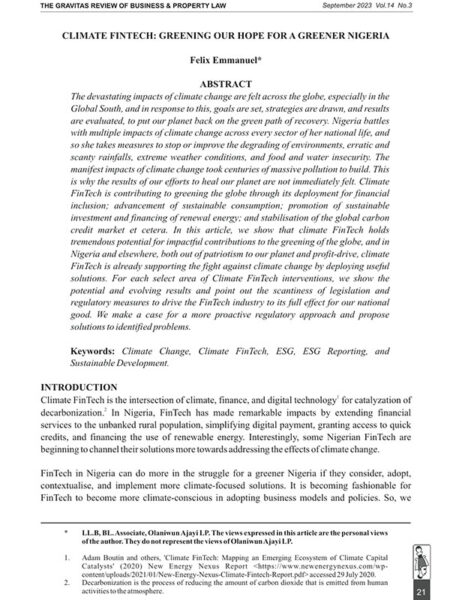
Climate Fintech: Greening Our Hope For A Greener Nigeria
0₦2,500.00Felix Emmanuel, in his article Climate Fintech: Greening Our Hope For A Greener Nigeria, unravels the relationship between the activities of fintechs and climate change. It shows that climate FinTech holds tremendous potentials of impactful contributions to the greening of the globe. It underscores the how climate FinTech are already supporting the fight against climate change by deploying useful solutions. For select areas of Climate FinTech interventions, the paper demonstrates the potentials and evolving results and point out the scantiness of legislation and regulatory measures to drive the FinTech industry to its full effect for our national good. Emmanuel makes a case for a more proactive regulatory approach and propose solutions identified problems.
-
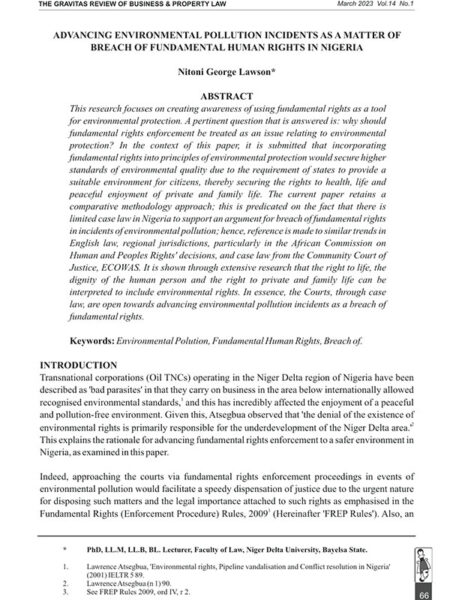
Advancing Environmental Pollution Incidents as a Matter of Breach of Fundamental Human rights in Nigeria
0₦2,500.00Nitoni George Lawson in his article, Advancing Environmental Pollution Incidents as a Matter of Breach of Fundamental Human Rights in Nigeria focuses on creating awareness on the use of fundamental rights as a tool for environmental protection. A pertinent question that is answered is: why should fundamental rights enforcement be treated as an issue relating to environmental protection? Lawson submittes that incorporating fundamental rights into principles of environmental protection would secure higher standards of environmental quality due to the requirement of states to provide a satisfactory environment for citizens, thereby, securing the rights to health, life and peaceful enjoyment of private and family life.
-
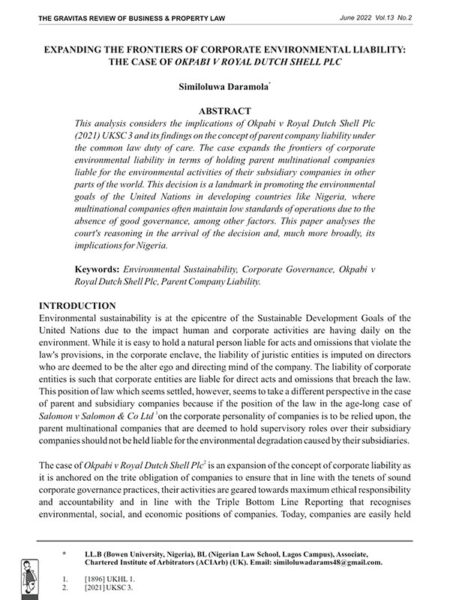
Expanding the Frontiers of Corporate Environmental Liability: The Case of Okpabi v Royal Dutch Shell Plc
0₦2,500.00Similoluwa Daramola, in her paper, Expanding the Frontiers of Corporate Environmental Liability: The Case of Okpabi v Royal Dutch Shell Plc, which reviews the English case, considers the implications of the case and the court’s decision on the concept of the parent company liability under the common law duty of care. The case expands the frontiers of corporate environmental liability in terms of holding parent multinational companies liable for the environmental activities of their subsidiary companies in other parts of the world. Similoluwa argues that the decision is vital in promoting the environmental goals of the United Nations in developing countries like Nigeria, where multinational companies often maintain lower standards of operations.
-
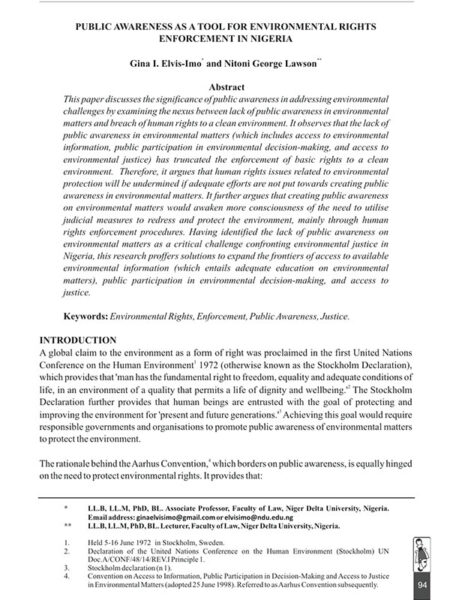
Public Awareness as a Tool for Environmental Rights Enforcement in Nigeria
0₦2,500.00Dr Gina Elvis-Imo and Nitoni Lawson, Associate Professor and Lecturer respectively, at the Niger Delta University, in their article, Public Awareness as a Tool for Environmental Rights Enforcement in Nigeria, discuss the significance of public awareness in addressing environmental challenges by examining the nexus between lack of public awareness in environmental matters and breach of human rights to a clean environment. They argue that human rights issues related to environmental protection will be undermined if adequate efforts are not put towards creating public awareness in environmental matters. Creating public awareness on environmental matters would awaken more awareness of the need to use judicial measures to redress and protect the environment. They then proffer solutions to expand the frontiers of access to available environmental information, public participation in environmental decision-making, and access to justice.
-
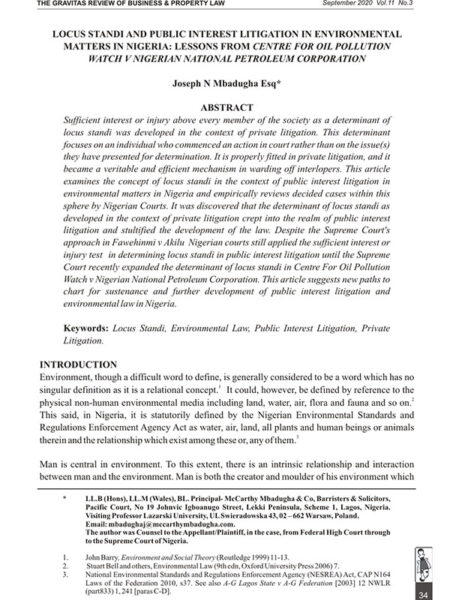
Locus Standi and Public Interest Litigation in Environmental Matters in Nigeria: Lessons from Centre for Oil Pollution Watch V Nigerian National Petroleum Corporation
0₦2,500.00Joseph Mbadugha of McCarthy Mbadugha & Co Lagos Nigeria, Visiting Professor of Lazarski University Warsaw, Poland and the Counsel to the Appellant/Plaintiff from the Federal High Court through to the Supreme Court of Nigeria in the case of Centre for Oil Pollution Watch V. Nigerian National Petroleum Corporation takes a second look at the landmark case. In his article, Locus Standi and Public Interest Litigation in Environmental Matters in Nigeria: Lessons from Centre for Oil Pollution Watch V. Nigerian National Petroleum Corporation, Mbadugha notes that ‘sufficient interest’ or ‘injury above other members of the society’, a determinant of locus standi developed in private litigation to ward off meddlesome interlopers, crept into the realm of public interest litigation with the resultant stultifying effect until the Supreme Court expanded the coast in COPW V. NNPC. He reviews decided cases in the evolution of locus standi in public interest litigation and suggests new paths for sustenance and development of public interest litigation and environmental law in Nigeria.
-
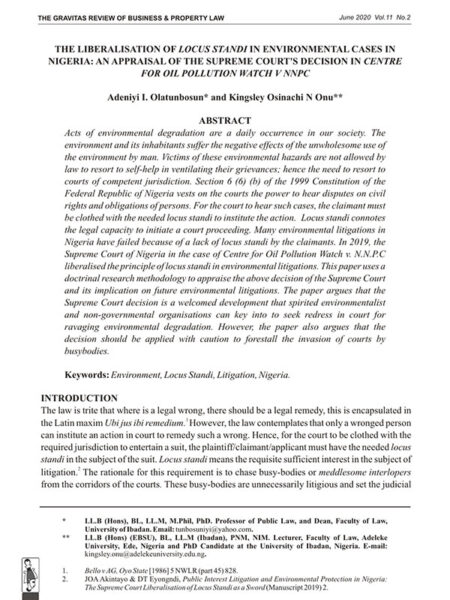
The Liberalisation of Locus Standi in Environmental Cases in Nigeria: An Appraisal of the Supreme Court’s Decision in Centre for Oil Pollution Watch v NNPC
0₦2,500.00Adeniyi Olatunbosun, Professor of Public Law, and Dean Faculty of Law, University of Ibadan, Nigeria and Kingsley Onu, Lecturer Adeleke University Ede Nigeria in their article, The Liberalisation of Locus Standi in Environmental Cases in Nigeria: An Appraisal of the Supreme Court’s Decision in Centre for Oil Pollution Watch v NNPC, comprehensively examine the concept of locus standi in environmental cases. They review the decision of the Supreme Court in COPW V NNPC regarding the locus standi of a non-governmental organisation to sue for an act of environmental degradation. They conclude with an analysis of the effect of the Supreme Court’s decision on future of environmental litigations in Nigeria.
-
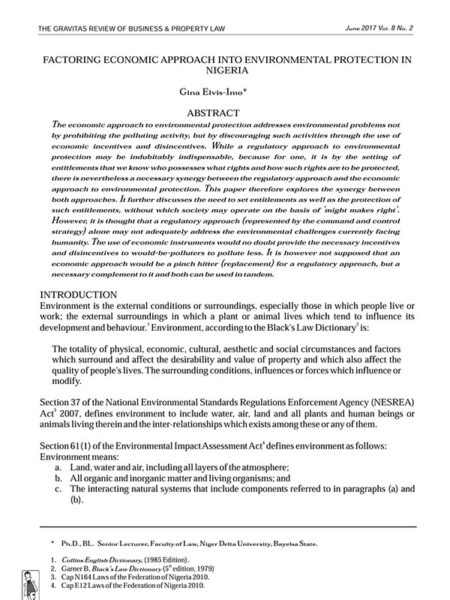
Factoring Economic Approach into Environmental Protection in Nigeria
0₦2,500.00Dr Gina Elvis-Imo, Senior Lecturer, Faculty of Law, Niger Delta University, Bayelsa State in her article “Factoring Economic Approach into Environmental Protection in Nigeria” examines various approaches, voluntary, regulatory and economic, to environmental protection. She argues that while a regulatory approach to environmental protection may be indubitably indispensable, the economic approach addresses environmental problems not by prohibiting the polluting activity, but by discouraging such activities through the use of economic incentives and disincentives. The paper explores the synergy between both approaches, and the need to set entitlements as well as the protection of such entitlements, without which society may operate on the basis of ‘might makes right’.
The Gravitas Review of Business & Property Law



